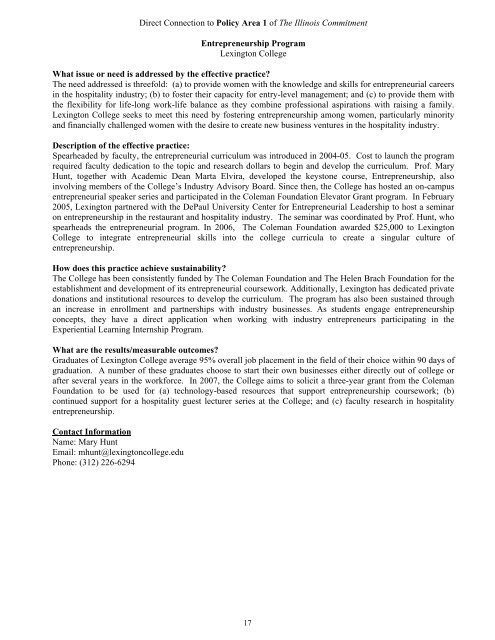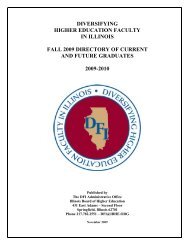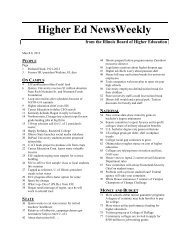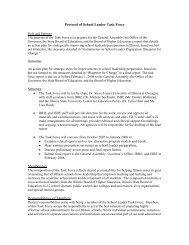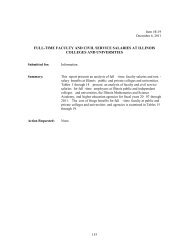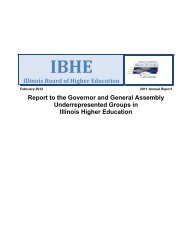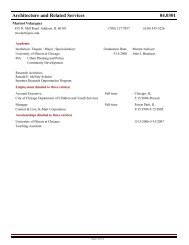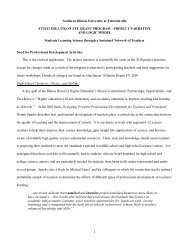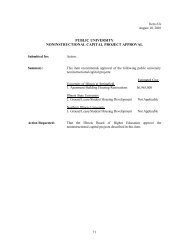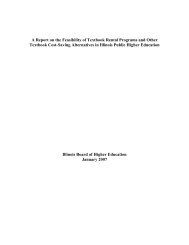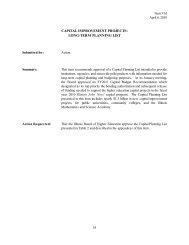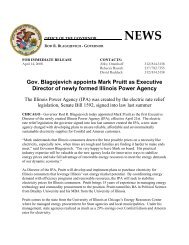Title of Effective Practice: - California Postsecondary Education ...
Title of Effective Practice: - California Postsecondary Education ...
Title of Effective Practice: - California Postsecondary Education ...
Create successful ePaper yourself
Turn your PDF publications into a flip-book with our unique Google optimized e-Paper software.
Direct Connection to Policy Area 1 <strong>of</strong> The Illinois Commitment<br />
Entrepreneurship Program<br />
Lexington College<br />
What issue or need is addressed by the effective practice?<br />
The need addressed is threefold: (a) to provide women with the knowledge and skills for entrepreneurial careers<br />
in the hospitality industry; (b) to foster their capacity for entry-level management; and (c) to provide them with<br />
the flexibility for life-long work-life balance as they combine pr<strong>of</strong>essional aspirations with raising a family.<br />
Lexington College seeks to meet this need by fostering entrepreneurship among women, particularly minority<br />
and financially challenged women with the desire to create new business ventures in the hospitality industry.<br />
Description <strong>of</strong> the effective practice:<br />
Spearheaded by faculty, the entrepreneurial curriculum was introduced in 2004-05. Cost to launch the program<br />
required faculty dedication to the topic and research dollars to begin and develop the curriculum. Pr<strong>of</strong>. Mary<br />
Hunt, together with Academic Dean Marta Elvira, developed the keystone course, Entrepreneurship, also<br />
involving members <strong>of</strong> the College’s Industry Advisory Board. Since then, the College has hosted an on-campus<br />
entrepreneurial speaker series and participated in the Coleman Foundation Elevator Grant program. In February<br />
2005, Lexington partnered with the DePaul University Center for Entrepreneurial Leadership to host a seminar<br />
on entrepreneurship in the restaurant and hospitality industry. The seminar was coordinated by Pr<strong>of</strong>. Hunt, who<br />
spearheads the entrepreneurial program. In 2006, The Coleman Foundation awarded $25,000 to Lexington<br />
College to integrate entrepreneurial skills into the college curricula to create a singular culture <strong>of</strong><br />
entrepreneurship.<br />
How does this practice achieve sustainability?<br />
The College has been consistently funded by The Coleman Foundation and The Helen Brach Foundation for the<br />
establishment and development <strong>of</strong> its entrepreneurial coursework. Additionally, Lexington has dedicated private<br />
donations and institutional resources to develop the curriculum. The program has also been sustained through<br />
an increase in enrollment and partnerships with industry businesses. As students engage entrepreneurship<br />
concepts, they have a direct application when working with industry entrepreneurs participating in the<br />
Experiential Learning Internship Program.<br />
What are the results/measurable outcomes?<br />
Graduates <strong>of</strong> Lexington College average 95% overall job placement in the field <strong>of</strong> their choice within 90 days <strong>of</strong><br />
graduation. A number <strong>of</strong> these graduates choose to start their own businesses either directly out <strong>of</strong> college or<br />
after several years in the workforce. In 2007, the College aims to solicit a three-year grant from the Coleman<br />
Foundation to be used for (a) technology-based resources that support entrepreneurship coursework; (b)<br />
continued support for a hospitality guest lecturer series at the College; and (c) faculty research in hospitality<br />
entrepreneurship.<br />
Contact Information<br />
Name: Mary Hunt<br />
Email: mhunt@lexingtoncollege.edu<br />
Phone: (312) 226-6294<br />
17


